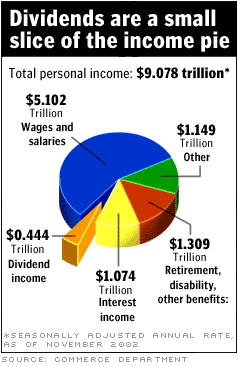NEW YORK (CNN/Money) - President Bush wants to eliminate taxes on corporate dividends as part of the economic stimulus package he announced Tuesday -- but the idea is getting mixed reviews from economists.

The idea is that erasing dividend taxes will give Americans more of an incentive to buy stocks, which will raise stock prices -- by about 10 percent, according to the Bush administration's latest estimate.
"It will be a boon to stocks and to capital investment," said Jerry Jasinowski, president of the National Association of Manufacturers. "Increasing the stock market will give business confidence a very big shock."
More confident businesses, making more money in the stock market, will, it's hoped, spend more. And that should eventually help the labor market, which has suffered during a recession that began in March 2001, with unemployment rising to about 6 percent from about 4 percent and staying there for a full year.
Meanwhile, higher stock prices could also encourage higher consumer spending, which makes up more than two-thirds of the total U.S. economy.
"The general rule of thumb is that, for each dollar change in [stock prices], there's roughly a 4-cent change in consumer spending," said Anthony Crescenzi, bond market strategist at Miller Tabak & Co. "If stocks rally 10 percent, that would increase the value of equities by about $1 trillion, adding about $40 billion in new spending to the economy."
Lower taxes will naturally put more money in taxpayers' hands -- eventually. Though the dividend cut might not take effect until 2004, some people might feel wealthier and spend more in 2003, particularly elderly Americans, who earn more than half of all the dividend income in the United States, according to some estimates.
"Any money given to seniors probably would get spent and therefore help the economy," Crescenzi said.
But will anyone notice?
Critics of the plan note that the impact of dividend income is small compared with the rest of the economy; according to November 2002 data from the Commerce Department, Americans were on a pace to earn about $444 billion in dividend income in 2002, compared with more than $9 trillion in total income.
Of that dividend income, much of it went into 401(k) and other tax-deferred plans -- meaning that many Americans who earn dividends won't even notice a dividend tax cut for some time.
| Related stories
|

|
|
|
|
"As a stimulus proposal, it's a non-starter," said Lacy Hunt, chief economist at Hoisington Investment Management. "The economic impact is very, very small -- almost imperceptible."
And most dividend income goes to wealthy Americans -- about 63 percent of all the dividend income taxed by the Internal Revenue Service in 2000, the latest data available, was earned by families making $100,000 or more, a group that accounts for less than 9 percent of all U.S. taxpayers.
"The stimulus to spending will probably be small because a lot of people that get dividends are already well-off, and any additional retained income they'll have may not change their spending patterns much -- they may just save more," said Kevin Logan, chief market economist at Dresdner Kleinwort Wasserstein.
Those who supporter eliminating the dividend tax suggest it will encourage businesses to raise money by issuing stock instead of debt -- a good thing, they say, since they believe debt is a riskier fund-raising method than stock.
"During economic recessions, when heavily indebted companies get in trouble and go bankrupt, that destabilizes the whole economy," Chris Edwards, director of fiscal policy at the Cato Institute, told CNNfn's Market Call program.
But it's debatable that cutting dividend taxes will really do much to change the way companies raise money. Unless the tax code is changed, businesses still will have more of an incentive to issue bonds than stock, since corporate interest payments -- on bonds and other debt -- are deductible, but dividend payments are not.
"In terms of corporate financing, the incentives won't change all that much [if the dividend tax is eliminated]," bond strategist Crescenzi of Miller Tabak & Co. said.
While it's throwing all this money at the economy, the federal government also could increase its budget deficit to about $250 billion in 2003. Higher budget deficits could fuel fears of inflation, which would drive up long-term interest rates, throwing cold water on the credit market -- including the mortgage refinancing market.
Many economists believe deficit government spending is acceptable, even desirable, during an economic slowdown. White House spokesman Ari Fleischer told reporters on Monday that President Bush thought stronger economic growth would help correct the federal budget in any event.
But the government ran a $150 billion deficit in 2002 after wiping out a surplus in 2001, yet the economy was still sluggish. Will deficit spending finally do the trick in 2003?
"The economy's not doing well, so it's appropriate to do what you can," said Hunt of Hoisington Investment Management. "But the notion that deficit spending is a panacea is greatly over-advertised."

|

